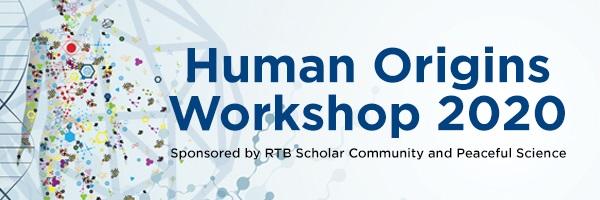Human origins brings us to grand questions that everyone asks. Reasons to Believe (RTB) is an organization founded by Dr. Hugh Ross, an astrophysicist, author, and pastor. Scientists at RTB believe the earth is old, but are skeptical about evolution. Still, around the questions of human origins, we are finding common ground.
Dialogue between RTB and Peaceful Science began the summer of 2018. RTB takes a “structuralist” or “ substantive” understanding of the image of God, similar to Catholics and protestants like William Lane Craig. They believe Adam and Eve were the first people in the image of God, they were the first Homo sapiens, and lived about 100 to 200 thousand years ago.
At first, we though that population genetics had definitely ruled out their understanding of human origins, but we were mistaken. I was surprised to learn there was more flexibility and diversity to their position than publicly visible. In particular, they already acknowledge interbreeding between Neanderthals and Homo sapiens. More importantly, I saw genuine willingness to truthfully engage the scientific evidence and adjust. The dialogue in private has encouraging, but now the conversation is becoming public.
A Way Forward for RTB on Human Origins
Addressing BioLogos, AJ Roberts writes that the RTB Model is “empirically equivalent” to the science at BioLogos. This seems like a strong claim. Given the scientific missteps she is addressing, however, Dr. Roberts might be right.
Indeed, the oft repeated claim that the human population never dipped below 10,000 is not substantiated. Consistent with the evidence, it might be possible at the origin of Homo sapiens for our ancestral population to dip much lower than 10,000, but not likely all the way to a single couple. To understand the technical details, see the summary of the 2018 ASA workshop and the presentation below.
But RTB could do better than just equaling BioLogos. In my opinion, their current model of human origins does not yet align with the evidence. Following Jack Collin’s suggestions, or perhaps some other creative proposals, they might arrive at a model of human origins that is entirely consistent with the evidence.
With these possibilities in mind, I am a Christian that affirms evolutionary science, but I see a way forward for them.
Summary: In 2018, private dialogue between PS and RTB began about the RTB model of human origins. RTB’s human origins model has, in the past, been critiqued sharply in the scientific community. Several scientists argued that population genetics demonstrated the RTB model false. In conversation with PS, it became apparent that some of the strong claims against the RTB model depended on important misunderstandings of the mainstream scientific consensus on population genetics. This presentation is intended to serve the RTB community by understandably explaining (1) how some of the scientific community misinterpreted the data and made incorrect claims regarding the viability of the RTB model, and (2) how the current scientific consensus on human population genetics makes space for the RTB approach. Some adjustments of the RTB model may be required to align with the evidence. These adjustments are a normal part of refining any model, and may fit comfortably within RTB’s theological constraints.
Conclusion: Many of the evidential claims against RTB’s human origins model were not valid. Dr. Joshua Swamidass, a scientist from PS, who personally affirms evolutionary science, sees a way forward for the RTB approach.
A Workshop on January 18th

There is a missing piece though. What exactly are the theological constraints? In what ways can they be flexible? Add on to this the shake up from my book, The Genealogical Adam and Eve, and there are lot of questions in the air.
Very generously, RTB invited us to a workshop on human origins at their headquarters in California, to discuss both my book and their model. Distinguished panelists will include theologians, scientists, and philosophers: Ken Keathley, William Lane Craig, Andrew Loke, Steven Schaffner, and Jeff Schloss. This workshop is a full day event, and it is organized around three presentations, each of which each raise several questions for me.
- Swamidass (public): How does The Genealogical Adam and Eve interact with old earth creationism? How do the insights here make space for RTB? Would RTB make space for us, perhaps as a faithful heterodox?
- Fazale Rana (public): What is the RTB model of human origins and what do scientists and theologians think of it?
- AJ Roberts (private): What is the range of acceptable and preferred views of human origins at RTB? What flexibility do they have in engaging the evidence? How big can they grow their tent?
This workshop will be livecast and then the video will be made available afterwards. If you are connected to Peaceful Science, you are also invited to attend the event in person. Come join the conversation with us if you can.
We are on the cusp of making real progress together. I cannot predict how the conversation will unfold from here. That is what make the exchange exciting.
I’m reminded of Dr. Ross’ endorsement of my book,
Swamidass proposes a genealogical Adam as a way to help resolve conflict among the competing creation and evolution models for human origins. He is to be commended for exhorting us all to ‘find that better way together’ to resolve our differences with patience and humility.
I look forward to continuing the conversation and seeing where this all leads. Let’s find that better way together.
References
- http://reasons.org
- https://peacefulscience.org/articles/assess-rtb-model/
- https://en.wikipedia.org/wiki/Image_of_God#Substantive
- https://peacefulscience.org/articles/invitation-to-rana/
- https://reasons.org/explore/blogs/theorems-theology/read/theorems-theology/2019/12/19/how-can-christians-disagree-over-adam-and-eve
- https://discourse.peacefulscience.org/t/_/61
- https://peacefulscience.org/articles/three-stories-on-adam/
- https://byfaithonline.com/the-case-for-adam-and-eve-our-conversation-with-c-john-collins
- https://ivpress.com/the-genealogical-adam-and-eve
- https://peacefulscience.org/books/genealogical-adam-eve/
Dec 28, 2019
Nov 22, 2021
Jul 5, 2025





